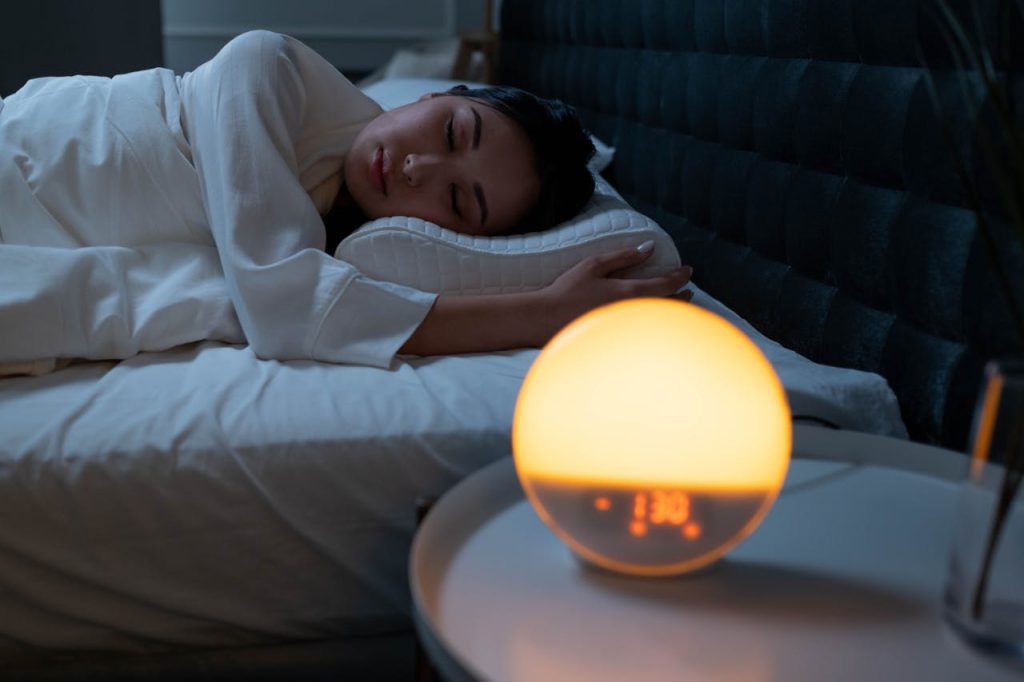10 Powerful Sleep Habits That Can Change Your Mental Health Forever 🧠💤

Good sleep isn’t a luxury — it’s a foundation for a strong and stable mind. In our modern lifestyle, stress, screens, and inconsistent routines destroy our ability to sleep deeply. But with the right sleep habits, your mind can recharge, reset, and even heal. These powerful sleep habits can truly transform your mental wellness if practiced consistently.
Why Sleep & Mental Wellness Are Deeply Connected 🛌
Sleep affects everything — your mood, focus, memory, and even how you react to emotions. In fact, a consistent sleep routine can improve symptoms of anxiety, depression, and chronic stress. By following a few simple changes, you can improve not only your nights but also your mental clarity during the day.
How These Habits Rewire Your Mindset 🌙
Each of these 10 habits is backed by science and psychology. When you apply them, you’re not just sleeping better — you’re giving your brain the break it deserves, allowing it to work better the next day. Let’s dive in!
Read more: Top 20 Deep Sleep Techniques for Mental Wellness
🌙 Let’s Explore 10 Powerful Sleep Habits That Can Truly Elevate Your Mental Health
Struggling with stress, anxiety, or restless nights? These powerful sleep habits are not just routines — they’re tools to calm your mind, recharge your body, and improve your mental wellness from the inside out. Let’s explore how you can transform your nights starting today. 🛌✨
1. Establish a Consistent Bedtime Schedule ⏰
Your body has a biological clock that depends on regularity. Going to bed and waking up at the same time daily resets your internal rhythm. This reduces stress hormones like cortisol and improves sleep quality. Stick to a schedule, even on weekends, and you’ll notice better mood, focus, and emotional balance.
2. Wind Down with a Relaxing Pre-Sleep Ritual 🌿
Before bed, engage in calming activities like reading, listening to soft music, journaling, or sipping herbal tea. These rituals signal to your brain that it’s time to rest. Avoid screens and blue light during this time. Creating a bedtime ritual is one of the most powerful sleep habits for long-term mental calm.
3. Optimize Your Sleep Environment 🛏️
Transform your bedroom into a true sleep sanctuary. Use blackout curtains, dim lights, and keep the room cool (around 65°F or 18–20°C). Minimize noise using a white noise machine or earplugs. A peaceful environment supports deeper, more restorative sleep and reduces nighttime awakenings.
4. Limit Caffeine & Screen Time Before Bed ☕📱
Caffeine and digital screens are sleep’s biggest enemies. Avoid caffeine after 4 PM, and reduce screen exposure at least 1–2 hours before bed. Blue light disrupts melatonin production, delaying your natural sleep cycle. Choose books or calming music instead to support your powerful sleep habits.
5. Get Daily Natural Sunlight Exposure ☀️
Daylight exposure, especially in the morning, helps regulate your sleep-wake cycle. It boosts serotonin during the day and supports melatonin production at night. Just 20 minutes of sunlight can improve your mood, mental clarity, and energy — making your sleep more natural and fulfilling at night.
6. Keep a Sleep Diary or Tracker 📓
Monitoring your sleep can reveal patterns and triggers that hurt your rest. Track your bedtime, wake-up time, screen usage, meals, and mood. After a week, review and adjust. This habit helps you develop self-awareness and identify your most powerful sleep habits for better mental balance.
Read more: 10 Nighttime Habits That Destroy Your Mental Peace (And How to Fix Them)
7. Avoid Heavy Meals & Alcohol Before Bed 🍔🍷
Heavy dinners or alcohol can disrupt digestion and interfere with deep sleep. Aim to finish dinner 2–3 hours before bed. Alcohol may make you feel sleepy but leads to poor sleep quality. Light snacks like almonds or banana with peanut butter are better alternatives for sleep support.
8. Incorporate Gentle Movement or Yoga 🧘
Physical activity like stretching, walking, or light yoga in the evening can relax your body and ease tension. It reduces cortisol and increases endorphins — helping you feel calm and ready for bed. Gentle movement improves both sleep quality and mental resilience over time.
9. Use Bed Only for Sleep & Intimacy 🚫📱
Using your bed for work, eating, or scrolling confuses your brain’s sleep association. Reserve your bed for sleep and intimacy only. This strengthens the connection between your bed and rest, helping you fall asleep faster and avoid late-night mental clutter or anxiety.
10. Practice Stress-Relief Techniques Before Bed 💆♂️
Stress is a major reason for insomnia and racing thoughts at night. Practicing breathing exercises, gratitude journaling, or guided meditation can release tension. These techniques clear mental noise and prepare the brain for deep, undisturbed sleep — boosting your mental health overnight.
🧘 Why Sleep Habits Are More Important Than You Think
In a world filled with constant noise, pressure, and technology, sleep often gets pushed to the bottom of our priority list. But neglecting sleep is like trying to run a marathon without resting — your mind wears out, your emotions burn out, and your body can’t keep up. That’s why developing powerful sleep habits isn’t just a luxury — it’s a necessity for a well-balanced mind. 💤
Whether you’re a busy parent, a stressed-out student, or someone battling anxiety, improving your sleep is one of the most natural and effective ways to regain mental clarity, emotional stability, and overall peace. And the best part? It doesn’t require any expensive equipment — just consistency, awareness, and care. 🌿
📊 The Science Behind Powerful Sleep Habits
When you build powerful sleep habits, you’re not just sleeping better — you’re allowing your brain to function in its most optimal state. Here’s what the science says:
- 🧠 Memory consolidation: Deep sleep helps your brain store and organize information.
- 😌 Mood regulation: Lack of sleep increases irritability, depression, and anxiety.
- 💪 Stress reduction: Quality sleep lowers cortisol levels and supports resilience.
- ✨ Neuroplasticity: During sleep, your brain forms new connections, which helps in learning and adapting.
That’s why these habits matter — they create the foundation for mental strength and emotional flexibility. 🛌
Read more: 10 Breathing Exercises That Help You Sleep Faster and Reduce Stress Naturally
🌿 How to Turn These Sleep Habits Into a Lifestyle
Reading about powerful sleep habits is a great start, but real transformation comes from applying them. Here are tips to stay on track:
- Start Small: Don’t try all 10 habits at once. Pick 2–3 and master them first.
- Create Triggers: For example, brushing your teeth can be your signal to put your phone away.
- Track Your Sleep: Use a notebook or app to monitor changes and patterns.
- Celebrate Wins: Slept 7 hours for 3 nights? That’s a win! Reward yourself with something relaxing.
Just like physical fitness, mental wellness through sleep requires time and patience — but the rewards are truly life-changing. 🌙
🛌 Common Myths About Sleep — Debunked
Let’s clear up some confusion that might be holding you back from building powerful sleep habits:
- ❌ Myth: You can “catch up” on sleep during weekends.
✅ Truth: Irregular sleep messes with your internal clock, making it harder to sleep well. - ❌ Myth: Adults need less than 6 hours of sleep.
✅ Truth: Most adults need 7–9 hours for full mental and physical recovery. - ❌ Myth: Alcohol helps you sleep.
✅ Truth: It may make you sleepy, but it disrupts your REM cycle and mental processing.
Knowing the facts is half the battle — applying them makes the difference.
💬 Real-Life Examples of Improved Mental Health Through Sleep
Still unsure if small changes in your bedtime habits make a difference? Take a look at these real-life scenarios:
🌟 Riya (32, Graphic Designer): After journaling and avoiding screens for 1 hour before bed, she reduced her panic attacks by 50% within 2 months.
🌟 Junaid (27, Student): He switched from late-night gaming to light stretching. Result? He reported feeling more confident and focused during exams.
🌟 Shila (45, Entrepreneur): Regular bedtime and blackout curtains helped her sleep deeper. She claims her business productivity jumped by 30%!
It’s not magic — it’s mindful lifestyle design. These stories prove that powerful sleep habits are accessible and effective for everyone. 💪
❓ Frequently Asked Questions (FAQs)
Q1: How long does it take to feel a difference from powerful sleep habits?
A: Most people start noticing changes in energy and mood within 7–14 days. Consistency is key. 🗓️
Q2: Can I still follow these habits if I work night shifts?
A: Absolutely! You’ll need to create a “night-like” environment during the day (dark, quiet, cool), and follow similar wind-down rituals. 🌃
Q3: Do sleep habits help with anxiety?
A: Yes. Many of these powerful sleep habits (like journaling, deep breathing, and screen reduction) directly reduce anxiety symptoms and support emotional regulation. 😌
Q4: What’s the best time to go to sleep?
A: Aim to sleep before midnight. 10 PM to 6 AM works well for most people, aligning with natural melatonin production. ⏰
Q5: Is napping okay?
A: Yes, but limit naps to 20–30 minutes and avoid napping late in the day so your main sleep isn’t disrupted. 😴
Read more: 10 Powerful Morning Habits for Better Sleep and Mental Health
🌟 Final Thoughts

Each of these powerful sleep habits supports both your body and mind. Start with one or two and gradually build your routine. With patience and practice, your sleep will become deeper, your thoughts calmer, and your energy sharper. You deserve to wake up refreshed — every single day.
To discover more about powerful sleep habits that truly enhance your well-being, explore this expert guide from the Sleep Foundation.
If you’re curious about how powerful sleep habits affect your mental and physical health, you can also read this helpful resource on Healthline.
💬 Which habit will you start today? Let us know in the comments!



Pingback: Top 10 Amazing Benefits of Kiwi for Better Sleep You Must Know😴